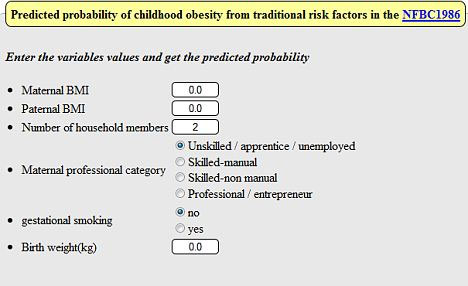It takes two minutes to know if the child is obese when he is growing up?
Scientists have created a table of six questions and it only takes two minutes to predict whether an infant will grow obese or not.
It is the brainchild of researchers at Imperial University - London, now available online. Researchers say this survey is used to help people build good habits so that their children are not overweight later. Professor Philippe Froguel, head of the study, said that once the child was obese, it was very difficult to lose weight, thus preventing it as an optimal method and starting as soon as possible.

Six questions help predict childhood obesity risk.
Froguel's research team selected six of the 12 obesity-related factors to formulate a questionnaire that accurately predicted children's obesity risk as they grew up.
1. Body BMI index (the ratio between weight to height).
2. BMI body index of mother.
If parents are overweight, children are at risk of obesity because they will mimic bad habits from their parents.
3. Number of family members: research shows that children with single parents have a higher risk of obesity because they are less cared for.
4. Mother's job (unskilled / apprentice / unemployed / experienced manual worker / experienced intellectual worker / expert / veteran).
5. Maternal smoking habits (smoking / non-smoking): mothers who smoke underweight babies, but they tend to be overweight when they grow up.
6. Weight of the child at birth.
This questionnaire was tested on a large scale in Finland, Italy and the United States and produced very fast and accurate results.
In PLoS ONE, researchers say parents with children at risk of obesity will be provided with information about proper nutrition and exercise. Parents are also educated about breast-feeding - one of the most effective ways to reduce the risk of obesity in children as they grow up, limiting television viewing and refusing to drink carbonated drinks.
Reference: Daily Mail
- Stigma makes fat people become more fertile
- It only takes 15 minutes to test the risk of pre-eclampsia
- Children with normal BMI are still obese
- Vietnam: It takes more than 1 hour to alert the tsunami
- The truth is less known about allergies
- Lack of sleep 30 minutes a day is easy to be obese
- 1/4 of women are obese during pregnancy
- The algorithm predicts whether a growing child can become a criminal
- Obesity involves restricting the use of seat belts
- Do not sit the toilet for more than 3 minutes
- The secret to teaching advocacy
- Obese people may lose vision
 Green tea cleans teeth better than mouthwash?
Green tea cleans teeth better than mouthwash? Death kiss: This is why you should not let anyone kiss your baby's lips
Death kiss: This is why you should not let anyone kiss your baby's lips What is salmonellosis?
What is salmonellosis? Caution should be exercised when using aloe vera through eating and drinking
Caution should be exercised when using aloe vera through eating and drinking